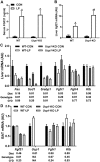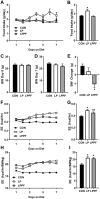Low protein-induced increases in FGF21 drive UCP1-dependent metabolic but not thermoregulatory endpoints
- PMID: 28811495
- PMCID: PMC5557875
- DOI: 10.1038/s41598-017-07498-w
Low protein-induced increases in FGF21 drive UCP1-dependent metabolic but not thermoregulatory endpoints
Abstract
Dietary protein restriction increases adipose tissue uncoupling protein 1 (UCP1), energy expenditure and food intake, and these effects require the metabolic hormone fibroblast growth factor 21 (FGF21). Here we test whether the induction of energy expenditure during protein restriction requires UCP1, promotes a resistance to cold stress, and is dependent on the concomitant hyperphagia. Wildtype, Ucp1-KO and Fgf21-KO mice were placed on control and low protein (LP) diets to assess changes in energy expenditure, food intake and other metabolic endpoints. Deletion of Ucp1 blocked LP-induced increases in energy expenditure and food intake, and exacerbated LP-induced weight loss. While LP diet increased energy expenditure and Ucp1 expression in an FGF21-dependent manner, neither LP diet nor the deletion of Fgf21 influenced sensitivity to acute cold stress. Finally, LP-induced energy expenditure occurred even in the absence of hyperphagia. Increased energy expenditure is a primary metabolic effect of dietary protein restriction, and requires both UCP1 and FGF21 but is independent of changes in food intake. However, the FGF21-dependent increase in UCP1 and energy expenditure by LP has no effect on the ability to acutely respond to cold stress, suggesting that LP-induced increases in FGF21 impact metabolic but not thermogenic endpoints.
Conflict of interest statement
The authors declare that they have no competing interests.
Figures






References
-
- Rothwell NJ, Stock MJ, Tyzbir RS. Energy balance and mitochondrial function in liver and brown fat of rats fed “cafeteria” diets of varying protein content. J Nutr. 1982;112:1663–1672. - PubMed
-
- Rothwell NJ, Stock MJ. Influence of carbohydrate and fat intake on diet-induced thermogenesis and brown fat activity in rats fed low protein diets. J Nutr. 1987;117:1721–1726. - PubMed
Publication types
MeSH terms
Substances
Grants and funding
LinkOut - more resources
Full Text Sources
Other Literature Sources
Molecular Biology Databases
Research Materials

